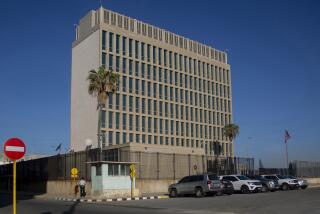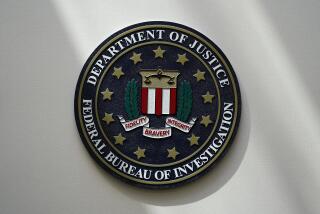State Department orders most U.S. Embassy staff to leave Cuba in response to unexplained health problems

At least 21 diplomats and their families have experienced unexplained health issues, including brain injury and hearing loss. (Sept. 29, 2017)
The State Department said Friday it had ordered more than half the U.S. Embassy staff and all diplomatic family members to leave Cuba because of a mysterious series of what it called “specific attacks” that have caused myriad health problems to 21 U.S. diplomats.
Only those who carry out the main U.S. diplomatic and consular duties, including providing emergency assistance to American travelers in Cuba, will stay at the embassy in Havana, officials said.
The State Department issued an advisory for Americans not to visit Cuba, although no tourists or other travelers have been affected by the still-unexplained attacks, which some outside experts suspect came from an acoustic device. The embassy, an iconic building on Havana’s waterfront, also will suspend processing U.S. visa applications.
Secretary of State Rex Tillerson said he had decided to trim staff and warn Americans in response to what he called “attacks of an unknown nature.” He emphasized that the moves were intended to ensure the health and safety of embassy personnel, not to punish Cuba.
“Until the Government of Cuba can ensure the safety of our diplomats in Cuba, our Embassy will be reduced to emergency personnel in order to minimize the number of diplomats at risk of exposure to harm,” Tillerson said.
Still, the dramatic moves were a blow to Washington’s delicate relations with Havana, which were restored in 2015, more than half a century after they were broken in the Cold War.
Over the last two years, U.S. airlines have begun direct flights to Cuba, tourism has surged and numerous travel and commerce restrictions were lifted. President Trump has reversed some changes but has broadly left the rapprochement in place.
Tillerson issued the statement in Beijing, where he is meeting Chinese officials to discuss efforts to restrain North Korea and to help set up Trump’s visit in November.
Aides said he made the decision on the flight from Washington, after considering options that included temporarily closing the embassy.
In all, 21 U.S. diplomats in Cuba have exhibited a wide range of physical symptoms, including ear complaints, hearing loss, dizziness, headache, fatigue, cognitive issues and difficulty sleeping. Several Canadian diplomats also have reported unusual physical ailments.
“Investigators have been unable to determine who is responsible or what is causing these attacks,” Tillerson said. Moreover, he said, the State Department “is unable to recommend a means to mitigate exposure.”
U.S. officials said the attacks occurred in the diplomats’ residences and in local hotels they frequent. The attacks began in mid-2016, and the most recent was in August.
The government mostly has referred to “incidents” rather than attacks in the past. But officials said Friday the U.S. now believes “specific attacks” targeted the diplomats in Cuba.
Tillerson emphasized that the U.S. is not breaking diplomatic relations with Cuba, noting that Havana “has told us it will continue to investigate these attacks and we will continue to cooperate with them in this effort.”
“We maintain diplomatic relations with Cuba, and our work in Cuba continues to be guided by the national security and foreign policy interests of the United States,” he said.
Cuba has allowed FBI agents in to help investigate the rash of health problems. And the Trump administration has stopped short of blaming Cuba for the attacks, leaving open the possibility that another country or group is responsible.
Experts have theorized that the attacks have been carried out by a machine that sends high-powered sound waves at a person, vibrating brain tissue and parts of the ear.
Russian intelligence agents have been known to use audio weapons, but the U.S. has not definitively determined who is responsible for the attacks in Cuba.
Investigators have struggled to unravel the mystery. FBI agents and other agencies have found devices in or near the homes and hotels that were affected. The wide range of symptoms, and questions of how and when people were impacted, have yet to yield clear clues.
Some diplomats reported hearing loud noises or feeling vibrations when the incidents occurred, but others heard and felt nothing yet reported symptoms later. In some cases, the effects were narrowly confined, with victims able to walk “in” and “out” of blaring noises audible in only certain rooms or parts of rooms, the AP has reported.
In a telephone briefing, a State Department official said the decision was aimed at reducing “the number of Americans who are vulnerable to exposure” from possible attacks.
“At this moment, we don’t have definitive information about the source or cause of the attacks,” said the official, who briefed reporters on condition of anonymity.
The State Department notified Cuba of the moves early Friday via its embassy in Washington. Cuba’s embassy had no immediate comment.
Staffing at the U.S. embassy already was down because of recent hurricanes. Early this month, the State Department allowed embassy employees and relatives who wanted to leave voluntarily to depart ahead of Hurricane Irma.
Cubans seeking visas to enter the U.S. may be able to apply through embassies in nearby countries, officials said. The U.S. also will stop sending official delegations to Cuba, though diplomatic discussions will continue in Washington.
Tillerson’s decision followed the highest-level diplomatic contacts between Washington and Havana since Trump took office in January.
The Cuban official who helped lead the diplomatic opening with the U.S., Josefina Vidal, came to the State Department last week to press for more time to investigate the attacks.
But when concerns grew about a possible embassy shutdown, Cuba requested an urgent meeting Tuesday between Cuban Foreign Minister Bruno Rodriguez and Tillerson at the State Department.
Rodriguez insisted his government was not behind the attacks and was trying to find the cause. He also said Cuba would not permit a third country to use Cuban soil to attack diplomats, according to a statement from the Cuban government.
The Cuban foreign ministry called the recent expulsion of two Cuban diplomats from Washington “unwarranted” and said Cuba “strictly abides” by its obligations to protect diplomats under the 1961 Vienna Convention.
Reaction on Capitol Hill was sharp Friday, with some Republicans calling for expulsion of all Cuban diplomats until those responsible for the attacks in Havana are found.
“The fact that we’ve had to withdraw over half of our diplomatic personnel from Cuba only two years after reopening our embassy there shows just how untrustworthy and malicious the Castro regime is,” said Sen. Tom Cotton (R-Ark.). “Our diplomats’ suffering is a sad lesson in the perils of trying to make nice with sworn enemies of America.”
UPDATES:
Noon: This article was updated throughout with Times staff reporting, including comments from Secretary of State Rex Tillerson.
This article was originally published at 7 a.m.
More to Read
Get the L.A. Times Politics newsletter
Deeply reported insights into legislation, politics and policy from Sacramento, Washington and beyond. In your inbox three times per week.
You may occasionally receive promotional content from the Los Angeles Times.







